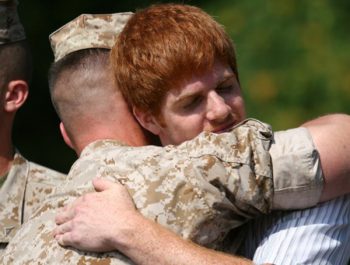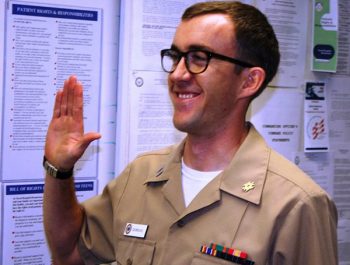
Do you know if any of your co-workers are military veterans?
Veterans work in just about every type of role at Seattle Children’s. You may work closely with a veteran and not even know it.
Veterans face special challenges in the workplace. Seattle Children’s Veterans Inclusion was formed in late 2019 to provide resources for veterans, recognize the contributions they make at Seattle Children’s, give them a voice within the organization and provide a place where veterans and their families belong.
To learn about the network’s activities and how workforce members can support veterans, we spoke with the leaders of the Veterans Inclusion Network:
- Jeff, chair: biomedical equipment technician III, Clinical Engineering; served in the Navy for 11 years, including during the first Gulf War
- Cameron, communications chair: senior Information Technology (IT) project manager, Disaster Recovery/Business Continuity; father, stepfather and other family members served, mostly in the Marine Corps
- Jesse, mentor liaison: senior director, Real Estate and Property Operations; served in the Navy for six years
What special challenges or considerations do veterans face in the workplace?
Jesse: Veterans sometimes have a hard time translating their military experience into civilian terminology for their resume. So, if you’re a hiring manager and see an applicant who is a veteran, take an extra minute to review what they’re trying to express in the resume and have an open mind toward how that may align with what you’re looking for. You’ve got to have an open mind because it might in fact be in their skill set, they just weren’t given the tools to translate that.
Cameron: In addition to translating the terminology, veterans face challenges because some certifications from the military aren’t legally allowed to be transferred to civilian settings. That’s why it was a big deal earlier this year when Washington state passed a law that made it easier for some military transportation certifications to transfer so they could do that same work on the civilian side.
Jeff: Some veterans also face mental health stresses. For example, I spoke with a co-worker who’s a veteran and did tours in Afghanistan and Iraq attached to a hospital unit. When the emergency COVID treatment tent hospital went up in Shoreline by the University of Washington’s clinic, it triggered that person heavily because it was the same kind of setup they’d worked in during those tours. That person needed to talk about it, and I was happy to do so. These things stay in the back of our minds, and they’re going to show up from time to time.
What are some of the network’s accomplishments so far?
Jeff: One big thing we did last year was a “get out the vote” campaign. We provided information to people, especially patient families who happened to be military, about how they could register to vote in their state, how soon they had to register before the elections and how to get a mail-in or absentee ballot. We were quite successful with that campaign and got a lot of good feedback. I think encouraging voting will always be one of the main things we do.
Cameron: We did that campaign in collaboration with the Hola Inclusion Network. Another priority for us is helping military families and veterans in general. For example, before the pandemic we were planning some in-person events to help prevent veteran suicide.
Jeff: We also did something during Christmas similar to Toys for Tots. We bought supplies and presents for a military family that had a patient at Children’s. That was great.
What are the network’s plans?
Cameron: Our big thing for the remainder of this year is building out our leadership team. Most of the inclusion networks have six or seven people in leadership, so we’re trying to get that filled out more. I think building up the leadership will help us increase the general membership.

Jesse: Cameron’s absolutely right: We need more people — both veterans and advocates. We need more leadership to join the group and help it evolve.
Jeff: I’m looking forward to continuing our involvement with the other Inclusion Networks and with their events and discussions, because I think that also helps us with ideas on how to grow in our own ways.
What do you enjoy most about the network?
Jesse: I like discovering all the people who have a military connection. It’s amazing how many people have left military service but stayed in a public service environment like healthcare. It’s inspiring.
Jeff: Besides the “get out the vote” efforts, I feel happy to be part of the larger group of Inclusion Networks. Being part of that group has given me a chance to be involved with the recent Covington investigation and how we’re moving forward with inclusion. I feel fortunate to be able to lend a little of the military background thinking to some of these issues.
Cameron: Outside of the items Jesse and Jeff mentioned, last year during the voting campaign a veteran’s spouse who works in Alaska reached out to us, and she did some stuff in Alaska during that time in connection with the Veterans Inclusion Network. Sometimes we get very focused on Seattle, but Children’s footprint is quite large. Being able to get that outreach to Alaska was a big deal.
How can Children’s workforce members support the Veterans Inclusion Network and veterans in general?
Cameron: Jeff’s point about civic engagement and voting is a big one. But more specific to Children’s is getting involved with the network and helping create ideas and things we can do for veterans at Children’s and in the area.
Jesse: When you’re seeking a diverse candidate base or want to build a diverse staff, consider someone’s military experience in that overall diversity equation and try to bring those people into your teams.
Jeff: From the Human Resources and recruiting standpoint, military veterans make good employees for many reasons besides the skill sets. It’s the attention to detail, showing up to work every day and being on time — things like that are ingrained in veterans. When you have a successful military career, it’s because everybody else depends on you. We should realize there are skills that won’t show up on a resume that come with someone from a military background.

